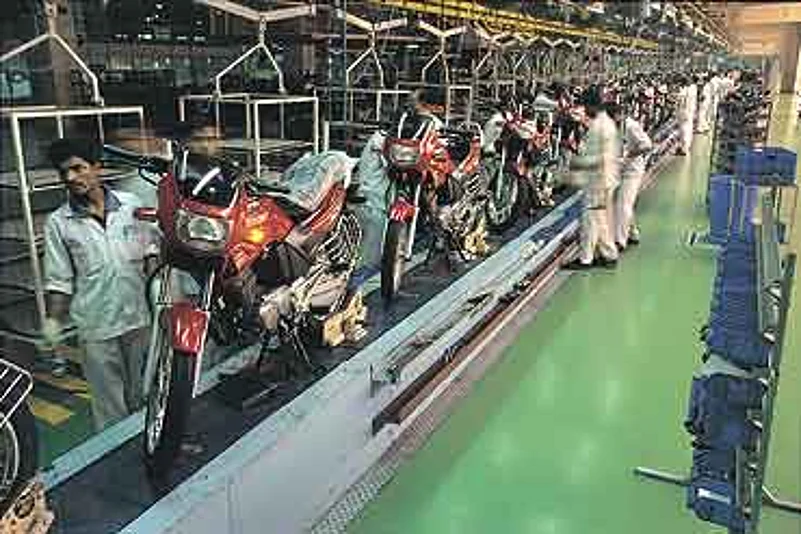But it raises a valid question too: why do top-notch companies shun freshly-minted graduates from renowned B-schools? Not just RIL, firms that operate in areas such as infrastructure and engineering, like L&T, auto firms like Mahindra and Mahindra, Maruti Udyog and Hyundai Motors and almost the entire consumer durables industry keeps a safe distance from the top B-schools. However, they have no qualms about hiring directly from engineering institutes with huge salaries that are comparable to those earned by fresh MBAs.
At one level, it’s just a matter of perception—among both the recruiting companies and the students. HR experts and placement coordinators contend that RIL and others perceive IIM students as being largely skewed towards areas like marketing, IT and consultancy. Hence, they seem to be misfits in companies that have a strong focus on operational excellence. "Graduates from elite B-schools are ambitious and seek fast-track growth, both in terms of job profiles and emoluments that firms like LG, Samsung or L&T cannot offer initially," explains Gurdeep Hora, CEO, Synergy Consultants, a Delhi-based placement agency.
Recruiters—and even some insiders—are convinced that IIMs don’t prepare students adequately for the corporate world. So, employers would rather source future managers from the less elite schools, as they can be trained and shaped. Asha Bhandarker of MDI, Gurgaon, undertook a study between 2000-04 to assess the value added by a B-school degree. She and her team spoke to over 1,200 students, alumni and recruiters. Surprisingly, their conclusion was simply this—‘not much’.

For example, B-schools, in their curriculum and overall training, focus on skills pertaining to numbers, such as analytical ability and presentation. But important factors—essentially soft skills, like teamwork or taking initiatives—are ignored. What emerged was—there’s a huge gap between what recruiters look for and what B-schools provide. Many recruiters complained that graduates were "individualists and often prefer working alone", did not know "how to work with people", were highly competitive but wanted "all credit for themselves". The critical challenges faced by the new managers after joining industry were managing superiors, delivering timely results, leading a team, motivating people, managing conflicts etc. Then there were company-specific requirements. For instance, a firm going in for M&A wants strong cross-cultural as well as change management competencies. These too were lacking.
As part of the above study, psychometric tests were conducted on nearly 800 B-school students upon joining and before graduating to assess the difference in the time spent at the school. The assessment had two sets of parameters: attributes like emotional intelligence, ability to work in a team and interpersonal rapport, and personality factors like the ability to deal with ambiguity, tolerance and flexibility. The syllabi of several business schools, including the IIM Ahmedabad, Bangalore and Calcutta, MDI, XLRI, Jamnalal Bajaj and S.P. Jain, were analysed. Recruiters were interviewed—108 from 80 firms, Indian and MNCs. Besides, 334 alumni of the top B-schools, all of whom graduated 2-5 years ago, were included in the survey.
Things haven’t changed much since then."Students from top-rung B-schools come with a lot of attitudinal baggage. We firmly believe managerial skills can be picked by most people, only if they have the right attitude," says Y.V. Verma, senior vice-president, LG Electronics. The Korean consumer appliance giant hires around 50 management trainees annually, but it shops at tier-II institutes like Amity,IMT Ghaziabad and MDI Gurgaon. Samsung too follows the same principle as far as entry-level managers go, but it is not loath to hiringIIMs at the middle and senior levels. "We are a fairly young company in India, and don’t quite have the size that appeals to the top B-school students," says Sanjay Bali, GM (corporate HR), Samsung India.
Bali has a point. For, even the IIM graduates are quite choosy when it comes to selecting their prospective employees. A lot of them don’t want to join old-economy firms or those that aren’t seen to be ‘sexy’ enough. "It’s more a matter of mismatched strategic objectives between graduates and the companies. In the last decade, marketing-driven sectors like telecom and financial services have raised the expectations of students," says Anita Ramachandran, CEO, Cerebrus Consulting, a Mumbai-based HR advisory. Last year, only 30 per cent of students who graduated from six top B-schools opted for engineering, manufacturing, FMCG and auto. The majority opted for consulting, telecom, financial services and IT.

According to Hora, industries like consumer durables and automobiles don’t offer top-notch B-school graduates the kind of intellectual challenges that an FMCG or a financial services company does. "The product lines (in the latter sectors) are so large that each one needs a different approach, whereas in durables and auto, sales are largely dictated by managing dealer relationships. The former demands a thorough understanding of products, consumers and trade partners while the latter is more consumer and trade-centric," he adds. (HDFC remains an exception and executive chairman Deepak Parekh prefers to scout for talent at second-rung institutes and groom them to become the best in the business.)
If that’s the case, some firms obviously wouldn’t want to visit IIMs during recruitment season. The reason: if they are not on the preferred list of students, most of the graduates would have found a job when the firms’ turn comes to interview them. (At IIMs, students are given a list of all companies that wish to visit the campus and are asked to rate them according to their preferences. Based on this ranking, employers are called to interview graduates. If a firm is ranked, say 110, its chance would come on the seventh day. By that time, everyone has got a job and is really not interested in more interviews.)
LG’s Verma dismisses this theory and feels that IIM students are usually not cut out for the rough and tumble of dealing with rural and semi-urban markets. "Besides, these students think they are the best. Therefore, those from less-fancied institutes are more motivated as they feel the need to prove themselves in the corporate world. In reality, there’s little to differentiate students from these two sets of institutions," he says. He rubbishes the claims that some firms avoid visiting top B-schools because they offer lower salaries. "We’re among the highest payers. If salaries were indeed low, our attrition rates wouldn’t be amongst the lowest," he concludes.
Another reason for the lack of interest among students, feels Cerebrus’ Ramachandran, is that several Indian companies in infrastructure and manufacturing sectors are less likely to provide global exposure, compared to the IT and consulting. Even manufacturing companies like Bilt, which have profitable operations overseas, tend to go manager-shopping at the lesser B-schools.
In the end, students from premier institutions aren’t too keen to join what they perceive as less challenging employers. The companies, in turn, aren’t too excited or enthused by the seemingly high-achievers. It’s a peaceful coexistence.


























